
Annual Conference
Prospects and Challenges for U.S.-China Relations
East Ballroom, Mayflower Hotel, Washington D.C.
July 25, 2017
Introduction
An international selection of U.S. and Chinese scholars gathered at the ICAS Annual Conference on July 25, Prospects and Challenges for U.S.-China Relations, to tackle some of the most daunting challenges in the Sino-American relationship. On the table was a discussion of the state of strategic relations between the two countries and how they could improve moving forward. Subsequent panels addressed opportunities for cooperation in the Asia-Pacific, such as the crisis on the Korean peninsula, recent developments in the South China Sea, and the state of trade and economic relations between the United States and China.
Opening Remarks by ICAS Advisory Board Chairman Dr. Wu Shicun
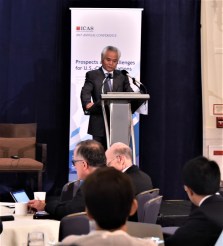 “This year’s annual conference comes at a pivotal time in the Sino-American relationship. With a new administration in the White House, it is essential that China and the United States find a way to leverage their significant influence on the global stage to resolve some of the most pressing issues of our time.”
“This year’s annual conference comes at a pivotal time in the Sino-American relationship. With a new administration in the White House, it is essential that China and the United States find a way to leverage their significant influence on the global stage to resolve some of the most pressing issues of our time.”
“As the first independent Chinese think tank in Washington, ICAS is in a unique position to facilitate dialogue and understanding between China and the United States. In our research on important issues such as the South China Sea dispute, the Belt and Road Initiative and the Crisis on the Korean peninsula, ICAS is able to deliver Chinese policy perspectives to a Washington audience, and provide Beijing with a behind the scenes view of what drives America’s foreign policy initiatives towards China.”
“In the three years that have passed since ICAS opened its doors, we have made significant progress towards achieving this goal. We have established roots in the D.C. think tank community and our experts produce some of the finest research and analysis in Washington. Perhaps most importantly, we have been able to effectively communicate our findings effectively to the public. Our experts make frequent media appearances and ICAS is slowly but surely becoming known as the go to source for expertise on China-America relations.”
“Today’s conference is central to the ICAS mission. The panelists will be discussing what is undoubtedly the most important bilateral relationship in the world. I hope you enjoy what they have to say.”
– Dr. Wu Shicun
Opening Remarks by Ambassador Cui Tiankai
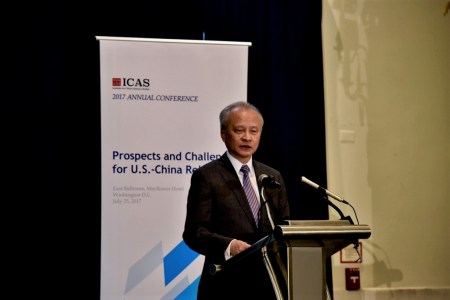 Ambassador Cui Tiankai emphasized that the Sino-American relationship is mutually beneficial. However, moving forward, both parties must work together to avoid creating a zero-sum game that could generate a Thucydides Trap, a situation where a rising power comes into direct conflict with the existing hegemon. That, the ambassador warned, would be deeply detrimental to the interests of both parties.
Ambassador Cui Tiankai emphasized that the Sino-American relationship is mutually beneficial. However, moving forward, both parties must work together to avoid creating a zero-sum game that could generate a Thucydides Trap, a situation where a rising power comes into direct conflict with the existing hegemon. That, the ambassador warned, would be deeply detrimental to the interests of both parties.
In order to enhance the stability of the relationship, the ambassador called for increased cooperation in the fields of economics and politics, in science and in technology, and in society and in culture.
The ambassador stressed that “there is actually no alternative” to this approach. “China and theU.S. have to work together to build a strong and stable relationship that is based on the principles of non-conflict, non-confrontation, mutual respect and win-win cooperation … The best way of overcoming a trap is to open up a new path. Our historic mission is not the transfer of global dominance from one power to another, by war or by less confrontational means. Rather, our mission is to establish a new model of international relations that are based on common interests and shared future.”
Panel 1: U.S.-China Strategic Relations
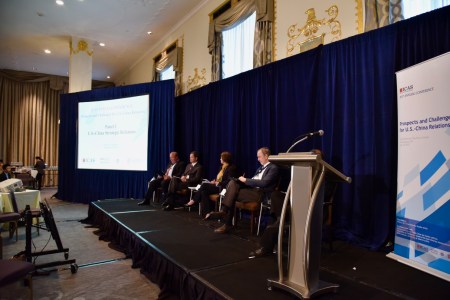 The first panel examined the strategic relationship between the United States and China with emphasis on several issues, including Taiwan, the South China Sea, North Korea, and the Belt and Road Initiative. There was optimism for cooperation on a number of these points, particularly on the crisis on the Korean peninsula. However, the panelists emphasized the unpredictability and fragility of the Sino-American relationship, which can stymie the potential for cooperation.
The first panel examined the strategic relationship between the United States and China with emphasis on several issues, including Taiwan, the South China Sea, North Korea, and the Belt and Road Initiative. There was optimism for cooperation on a number of these points, particularly on the crisis on the Korean peninsula. However, the panelists emphasized the unpredictability and fragility of the Sino-American relationship, which can stymie the potential for cooperation.
Several panelists argued that concrete measures need to be taken if the United States and China are to avoid a Thucydides Trap. As China’s soft and hard power continues to grow, it risks coming into conflict with the existing hegemon, namely the United States. Although the status quo makes war between the two parties seem unthinkable, the panelists agreed that stronger, more enduring ties need to be established, particularly in the political and military realm, in order to stabilize and bring predictability to future Sino-American relations.
Panel 2: U.S.-China Cooperation on Flashpoint Issues in the Asia-Pacific
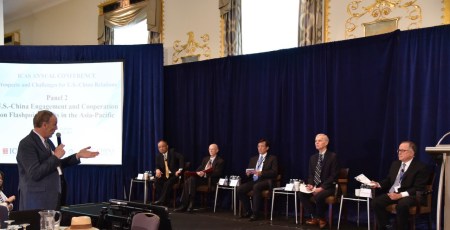 The second panel focused on two flashpoint issues in U.S.-China relations: the crisis on the Korean peninsula, and cross-strait relations with Taiwan. In both instances, the United States and China have a fundamentally different understanding of the issues. Both parties agree that denuclearization of the Korean peninsula should be the ultimate goal, but disagree on how to achieve that goal. The United States wants to put maximum pressure on the regime, and would likely welcome its eventual collapse. For China, this scenario is disastrous.
The second panel focused on two flashpoint issues in U.S.-China relations: the crisis on the Korean peninsula, and cross-strait relations with Taiwan. In both instances, the United States and China have a fundamentally different understanding of the issues. Both parties agree that denuclearization of the Korean peninsula should be the ultimate goal, but disagree on how to achieve that goal. The United States wants to put maximum pressure on the regime, and would likely welcome its eventual collapse. For China, this scenario is disastrous.
From a Chinese perspective, the only thing worse than a nuclear North Korea, would be the establishment of a unified Korea on its border that is aligned with the United States. For that reason, Beijing is extremely reluctant to put maximum pressure on Pyongyang, fearing that it could inadvertently cause the regime to collapse.
On Taiwan, the panel was pessimistic for the future of cross-strait relations. Beijing continues to isist that Taiwan is part of China, and the details of their policy on this issue has barely shifted since 1992. The same is true of the American position, which formally endorses the one-China policy, but continues to back the authorities in Taipei. However, no concerted effort to
establish common ground in the dispute has been made since then, making it difficult to see a way forward from the status quo.
Panel 3: Developments in the South China Sea & Friction in U.S.-China Maritime Ties
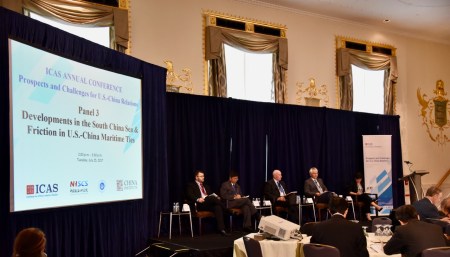 The third panel was focused on the South China Sea and evaluated potential mechanisms for resolving the region’s sovereignty and sovereign rights disputes. The panelists generally agreed upon the main factors influencing the maritime disputes, pointing to vague assertions about the Nine-Dash Line from China, the conduct of freedom of navigation operations by the United States, the role of ASEAN and bilateral relations between member states, and the power of public opinion in all involved states.
The third panel was focused on the South China Sea and evaluated potential mechanisms for resolving the region’s sovereignty and sovereign rights disputes. The panelists generally agreed upon the main factors influencing the maritime disputes, pointing to vague assertions about the Nine-Dash Line from China, the conduct of freedom of navigation operations by the United States, the role of ASEAN and bilateral relations between member states, and the power of public opinion in all involved states.
Since the arbitral tribunal’s award last year, favoring a range of the Philippines sovereign rights and jurisdiction claims and rejecting China’s, tensions have eased significantly in the South China Sea. However, this is less due to the ruling itself, than the willingness of the new president of the Philippines, Rodrigo Duterte, to forego near-term implementation of that ruling and collaborate with China on a variety of fronts. One panelist observed that Duterte was an “accidental genius,” who is playing all sides, getting concessions from China, the United States, and ASEAN without offering much in return. However, it is far from clear that this new reality will last, and tensions in the region could easily flare up again.
There was less consensus on what policy shifts could contribute to easing tensions in the South China Sea. Some panelists applauded the dual track approach, as exemplified by the possibility of joint exploration of oil and gas by China and the Philippines, while others opposed China’s efforts in general, questioning the legal basis of the Nine-Dash Line as a vehicle to assert its maritime rights claims.
Panel 4: Economic and Trade Relations with China
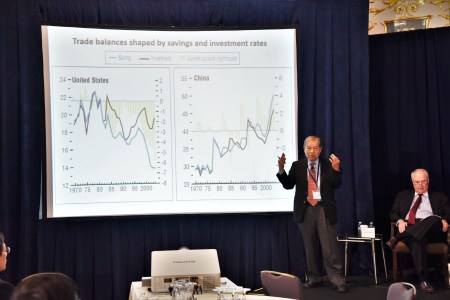 The fourth panel saw a discussion of trade and economic relations between the United States and China. A clear consensus arose that Trump’s proposed protectionist policies would be detrimental to the relationship, and would have long term implications for the interests of both parties.
The fourth panel saw a discussion of trade and economic relations between the United States and China. A clear consensus arose that Trump’s proposed protectionist policies would be detrimental to the relationship, and would have long term implications for the interests of both parties.
One panelist observed that contrary to popular belief, the large U.S. trade deficit is largely derived from U.S. trade with Asia – not China specifically. Policy recommendations included working
out a bilateral investment treaty to ensure the secure transfer of advanced technologies on fair commercial terms, and increasing the frequency of high level economic meetings like the Comprehensive Economic Dialogue. Overall, the panelists concluded that further economic liberalization and reciprocity was needed from China, and expressed hope that the United States would reconsider implementing protectionist measures against China.
Conclusion
A common theme that emerged during the day was respect for international law. This is especially key to resolving the myriad of sovereignty and sovereign rights claims in the South China Sea. As the two biggest players on the global stage, China and the United States both have the ability to set the tone for the conduct of international relations. Establishing a set of ground rules that everyone can agree upon is central, but complying with those rules is even more crucial.
The overall theme of the conference was positive. Within the last year, more issues have been resolved than have arisen in the U.S.-China relationship. However, that positive trend should not be taken for granted. President Trump must develop a China policy that is based on reality, not the aggressive rhetoric he used on the campaign trail. China should take a constructive approach in shaping this policy and work to address U.S. concerns and interests in the pursuit of its own economic and security interests.
Organized by
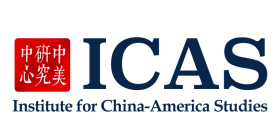

In Collaboration with




